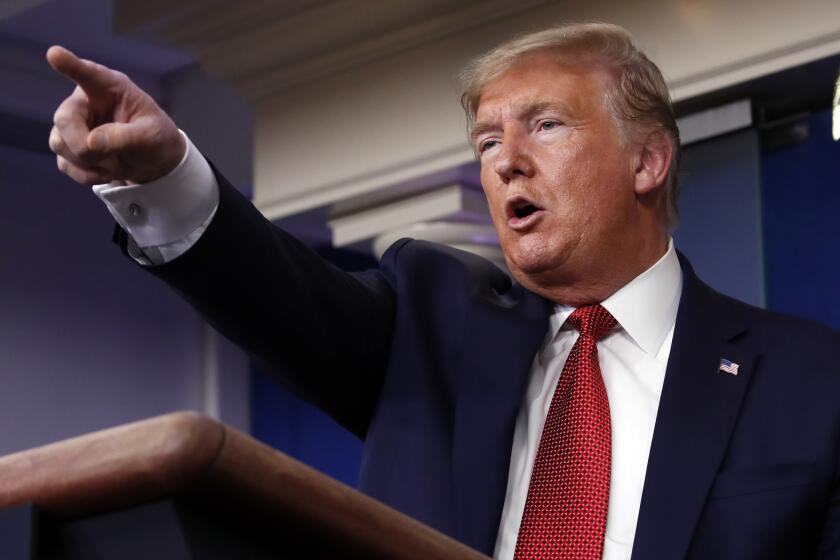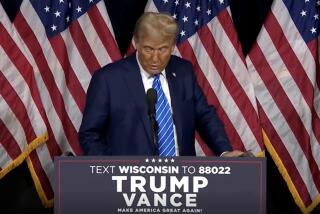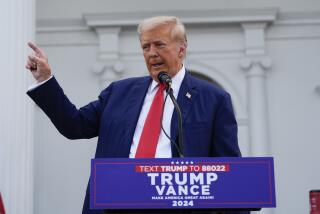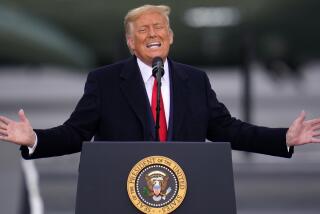Always the salesman, Trump touts products and promises at coronavirus briefings
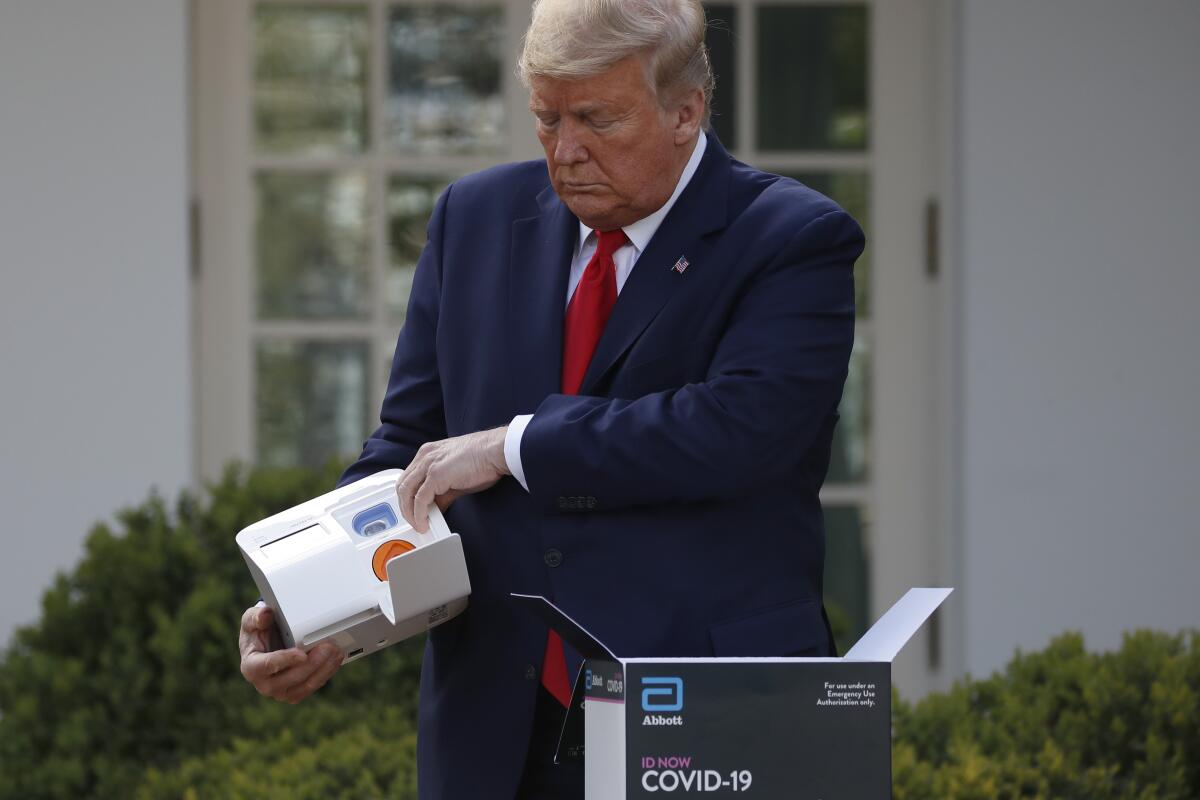
WASHINGTON — As TV cameras tracked him, President Trump walked from the Rose Garden podium to a nearby table for the dramatic unveiling of a new and improved product, one supposedly able to deliver faster, better results.
As the head of the Food and Drug Administration extolled the coronavirus testing kit, Trump opened a box, carefully pulled out the device and held it up for viewers to see on Monday, like a scene from a Home Shopping Network show.
After decades of slapping his name on skyscrapers, steaks, bottled water and silk ties, Trump remains a salesman at heart, and he’s used his daily pandemic briefings at times to push new products, promote unproven remedies and make exaggerated promises.
Even as he warned Tuesday of “very very painful” weeks ahead, possibly involving 100,000 American deaths, he promised a “burst of light” once the pandemic passes.
“Trump is most comfortable when he’s selling,” said Michael D’Antonio, who wrote a biography of Trump. “And when he doesn’t have something to sell, he sells himself. And that’s really the product that he always sells.”
While Trump has praised the doctors at his side, chiefly Dr. Anthony Fauci, who heads the National Institute of Allergy and Infectious Diseases, and Dr. Deborah Birx, the White House response coordinator, he more often has shown disdain for specialists, whether it involves global warming or nuclear diplomacy.
“He’s more comfortable around salesmen than he is around scientists and physicians,” D’Antonio said. “He doesn’t understand this idea of seeking honest data so you can get your arms around a problem that’s difficult.”
Trump has promised a “very advanced” coronavirus vaccine in “record time,” for example. Although a crash program has found potential candidates, experts say necessary testing, dosing and production of a new vaccine will take at least a year.
Trump claims he saved “thousands” of lives by restricting travel from China on Jan. 31. Public health experts say the administration squandered any time it bought.
He has announced “tremendous progress” on a nationwide website for coronavirus testing even though the website remained a pilot project in the San Francisco Bay Area.
And the president has touted drug regimens to treat COVID-19 patients, saying they “could be a tremendous breakthrough,” even though they have not gone through approved clinical trials to ensure they are effective.
The drugs, hydroxychloroquine and chloroquine, are normally prescribed as a prophylaxis or treatment for malaria and lupus, and some doctors fear the president’s endorsement will lead to shortages for patients who rely on them.
Despite the concerns, the FDA approved the two drugs for emergency use during the pandemic, and Trump announced Monday that his administration had secured millions of doses.
Trump has rejected bipartisan criticism that his administration botched its early response to the coronavirus by failing to make testing widely available, and that it is still struggling to supply desperately needed masks, ventilators and other equipment to hospitals.
On Tuesday, Maryland Gov. Larry Hogan, a Republican, dismissed Trump’s claim that coronavirus testing kits are now widely available as “just not true,” adding, “No state has enough testing.”
And New York Gov. Andrew Cuomo, a Democrat, compared the lack of federal leadership to coordinate distribution of medical supplies to “being on EBay with 50 other states, bidding on a ventilator.” New York has the nation’s worst outbreak, and Cuomo has said his state needs 30,000 ventilators.
Trump has lavishly praised himself for “tremendous” work while routinely blamed others — including China, former presidents, governors and reporters — for any problems. As in his business career — which includes a string of bankruptcies and lawsuits claiming fraud — he’s glossed over bad news and moved on.
“You never cop to anything, and you always declare that you’ve won, and you always point the finger at somebody else,” said Gwenda Blair, another Trump biographer. “And he’s remarkably good at that.”
Trump’s approach is evident in his shifting timeline for beating back the pandemic.
A month ago, he suggested the virus would disappear “like a miracle” as soon as warm weather came in April. But on Monday he extended social distancing guidelines until April 30, acknowledging the virus may not peak for several weeks.
It’s an approach that many American voters saw for the first time in the 2016 presidential race, Trump’s first official foray into politics after making his name as a New York developer and reality television star. At times he used his campaign to promote his products and properties.
During the Republican presidential primary, he held a news conference with a table piled high with Trump-labeled wine, bottled water and steaks in an effort to rebut charges that his businesses were unsuccessful.
“Trump steaks, where are the steaks? Do we have the steaks?” he said. “We have Trump steaks. And by the way, you want to take one, we charge you about, what, 50 bucks a steak?”
At that point, Trump steaks were no longer available for purchase, and the meat on the table appeared to be from a different brand.

Like any aggressive salesman, Trump enjoys a good cross promotion, and he’s invited business leaders to the White House to burnish their own brands while showering him with praise.
At Monday’s briefing, Trump introduced Mike Lindell, the founder of My Pillow, which has agreed to produce cotton face masks during the pandemic.
“Boy, do you sell those pillows. That’s unbelievable what you do,” Trump said.
After plugging his own company, Lindell plugged Trump too.
“God gave us grace on Nov. 8, 2016” — the day Trump was elected — “to change the course we were on,” he said.
The president then invited executives from Honeywell, Jockey International, Procter & Gamble and United Technologies to promote their own work and praise his administration.
Trump hosted a similar parade of corporate executives on March 13, a performance that led to a brief boost in the stock market after sharp declines.
The next day, Trump said he was “honored” by the market rebound and suggested it made financial sense for companies to associate themselves with his administration.
“Those great companies that were there, they couldn’t have been too unhappy either, when you think about it, because they’re all very big, publicly listed companies,” he said. “So they did a good job.”
It was a sign, at least in the president’s eyes, that the Trump brand hadn’t lost its luster.
More to Read
Get the L.A. Times Politics newsletter
Deeply reported insights into legislation, politics and policy from Sacramento, Washington and beyond. In your inbox three times per week.
You may occasionally receive promotional content from the Los Angeles Times.
